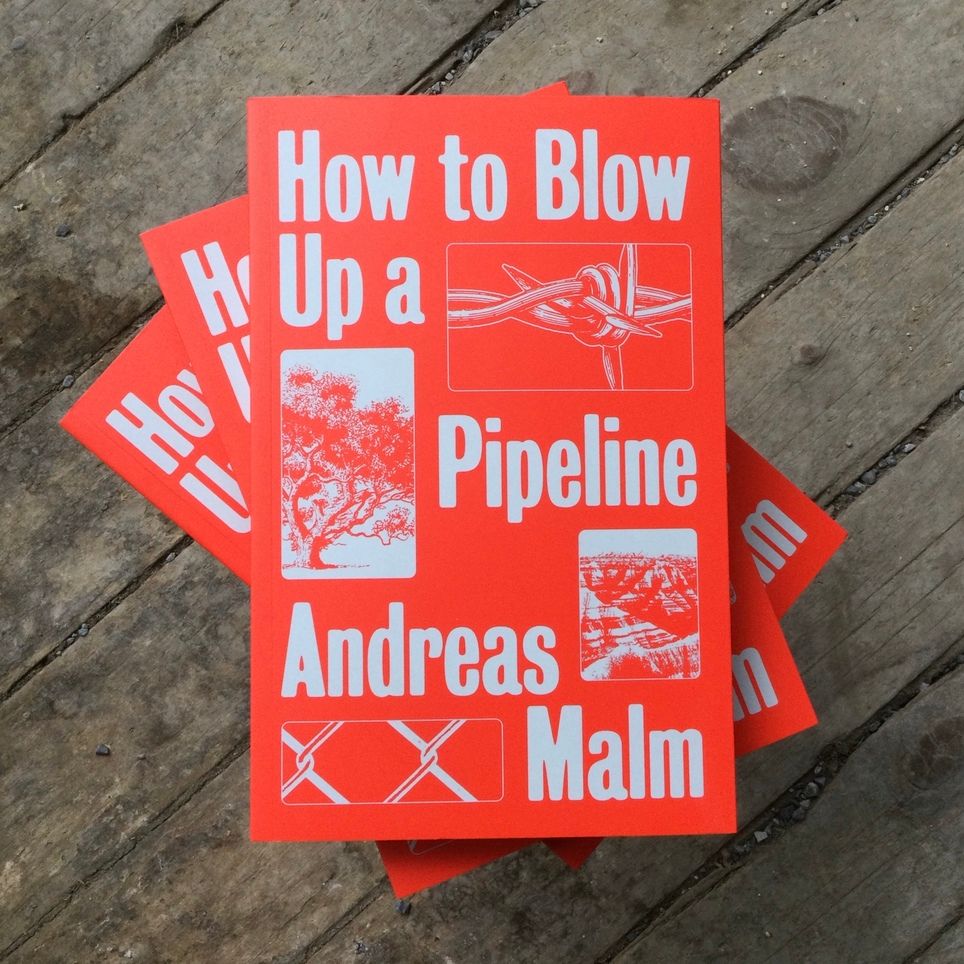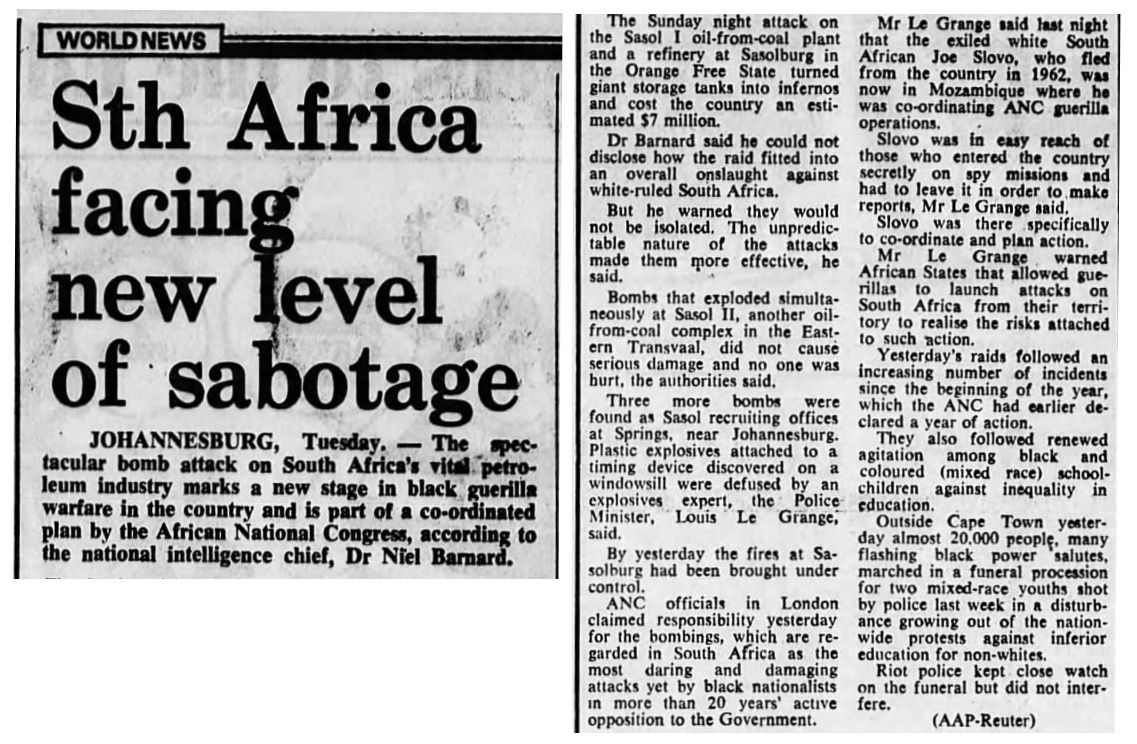Why Climate Resistance Needs To Get Violent
Fossil fuel infrastructure isn't going to destroy itself

Nelson Mandela said "I called for non-violent protest for as long as it was effective." When it stopped being effective, he got into property damage. Sabotage. He said “if sabotage did not produce the results we wanted, we were prepared to move on to the next stage: guerrilla warfare and terrorism.” This is precisely the footing the climate movement needs to be on now. It's time to blow up some pipelines.
This is in fact what Andreas Malm calls for in his book How To Blow Up A Pipeline, and I'll go through a few of his arguments here.

One thing Malm proposes is physically attacking fossil fuel infrastructure, like Mandela's MK unit did (though for different reasons). In 1980 MK hit the Sosol coal-to-oil plant and it was an important moment in the struggle against apartheid:
“Lasting for three days, the smoke plume could be seen by electrified audiences in Johannesburg: it ‘shattered the myth of white invulnerability. It was not about the quantity of oil that was lost … it was that column of smoke that was important. Sasol was a symbol of power,’ in the words of ANC militant Frene Ginwala”
Today we're fighting a bigger problem than apartheid and it's going to take at least as much commitment to action as Mandela had. What Malm asks us today is "When do we start physically attacking the things that consume our planet and destroy them with our own hands? Is there good reason we have waited this long?"
At this point anyone can see that all the protests, meetings, and pledges haven't done shit. Since COP1, emissions have increased 60%. Since COP10, fossil fuel infrastructure nearly doubled. COP26 was just a farce. All Cops Are Bastards, and it's time to burn some cop cars.
For decades now the climate resistance movement (among rich people) has been scrupulously non-violent. This has made it quite popular, and also quite ineffective. Climate change as become an advertising tagline, not something remotely threatening to the status quo. Activists complain about politicians not taking action, but the activists are not taking action either. Someone has to lead.
The risk is that violence will make the climate justice movement unpopular, but this isn't a popularity contest. Attacking fossil fuel infrastructure will be very unpopular because people will have power outages, economies will suffer, and yet this is precisely what needs to be done. Only obviously broken things get fixed. That's the point of sabotage. As Mandela said during his brief command of the MK (before being arrested for 27 years):

This is the scale of commitment required to get some racists out of South Africa. It's absolutely folly to think that we're going to fight climate collapse with anything less.
The strategy here is not that people physically destroy all fossil fuel infrastructure (which is still only part of the problem). The strategy is a pincer movement. A violent wing of climate rebellion causes so much trouble that governments are forced to negotiate with the 'reasonable' people. This is in fact how non-violent movements have worked through. It takes two sides to flip a coin.
In the US, for example, the Civil Rights Act was passed with Martin Luther King inside the tent because the US government was so afraid of Malcolm X and everybody else agitating outside. As Malm said, “The civil rights movement won the Act of 1964 because it had a radical flank that made it appear as a lesser evil in the eyes of state power.”
As the scholar Herbert H. Haines said, “Nonviolent direct action struck at the heart of powerful political interests because it could so easily turn to violence. The result was federal action designed to make further protest unnecessary.” This was called the radical flank effect. Basically you need to kick governments in the ass to get them to do anything.
King himself said 'millions of Negroes, out of frustration and despair, will seek solace and security in black nationalist ideologies’ and then ‘the streets of the South would be flowing with floods of blood.' That is what it took for America to budge. It is—as I said—folly to expect the ruling class of today to lift a finger for anything less.
Hence you get to the crux of Malm's book. Malm quotes a 1960s Black Power activist saying "Protest is when I say I don't like this. Resistance is when I put an end to what I don't like." What Malm calls for is moving from climate protests to climate resistance. To outright property damage. And I agree. He says:
Here is what this movement of millions should do, for a start: announce and enforce the prohibition. Damage and destroy new CO2-emitting devices. Put them out of commission, pick them apart, demolish them, burn them, blow them up. Let the capitalists who keep on investing in the fire know that their properties will be trashed.
What Malm calls for is what indigenous people have been doing for decades, like the Wet'suwet'en right now. Blocking pipelines. Actually stopping emissions, with bodies and lives, not just politely asking and getting nodding and lies.
As much as we complain about politicians not taking action, but we're part of the same hypocrisy. If we don't take action, neither will they. As long as we keep talking, that's all we'll get in return. Hence we have to stop asking other people for climate action. We need to start blowing up pipelines, slashing tires, and literally fight climate change with our bare hands. Why do we need to do this? Let me put it plainly. Either property destroys the world or we destroy some property. This is actually the least violent way.